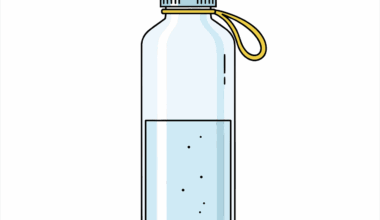Post-Workout Nutrition and Weight Gain: Clearing Up Common Confusions
Post-workout nutrition can spark a lot of debates, especially concerning its role in weight gain. Many believe that consuming food after exercising automatically leads to weight gain. The truth is much more nuanced and depends on several factors beyond mere timing. Post-workout meals consist of carbohydrates and proteins, which are vital for recovery and muscle growth. Adequate protein intake assists in muscle repair while carbohydrates replenish glycogen stores used during workouts. This recovery process is essential to maintain energy levels for subsequent workouts. However, it is crucial to manage the total caloric intake consistently. Eating excessively, even after a workout, can lead to weight gain. The body requires different nutrients depending on the intensity of exercise. For instance, strength training might necessitate more protein compared to lighter cardio. The timing of nutrient intake following exercise is indeed important, but only when integrated into a balanced diet tailored to individual health needs. Therefore, understanding the context behind post-workout nutrition can alleviate the misconceptions surrounding weight gain in fitness enthusiasts.
Many people believe that if they do not eat immediately after exercising, they risk missing critical recovery benefits. This commonly held belief relates to the body’s metabolic window, which suggests a limited time to consume high-quality nutrients post-exercise. It’s essential to acknowledge that while there is a peak time for nutrient intake benefits, it isn’t as narrow as once thought. Research suggests a post-exercise nutrition can help repair and grow muscles, but this can occur even hours after the workout. As long as a balanced meal containing macronutrients follows within a few hours, recovery will not suffer significantly. It is also crucial to avoid unnecessary stress about immediate nutrition as it can lead to unhealthy eating habits later. When your body is under stress from workouts, it prioritizes protein utilization for recovery. Additionally, having a sensible meal plan allows flexibility regarding when to eat after a workout. Therefore, focus on overall nutrient needs rather than strict timing. Balance is the key here. By structuring meals to include vital nutrients, long-term fitness goals can be met without the stress of timing.
Misunderstandings About Calories and Macros
One prevalent myth in post-workout nutrition is the overestimation of calorie consumption post-exercise. People often believe they can eat whatever they desire due to their workout, leading to the misconception that exercise allows for unrestricted eating without consequences. This can be misleading, as the number of calories burned during exercise may not equate to the number of calories consumed afterward. In fact, many individuals tend to miscalculate their calorie expenditure, leading to feelings of security in indulging after a workout. Another important aspect is the distribution of macronutrients. A post-workout meal rich in protein and low in sugars can prevent unwanted weight gain while still promoting muscle recovery. Ideally, an individual should aim for a balanced meal alongside a sustainable caloric intake. Healthy fats can be part of the post-workout recovery as well, contributing needed nutrients. Instead of associating post-workout meals with excessive caloric intake, think about them as tools for health optimization. Engaging in mindful eating and analyzing total daily intake helps maintain a balance where workouts complement overall wellbeing, not sabotage it.
Hydration also plays a pivotal role in post-workout recovery and weight management, yet it often goes overlooked. Many athletes prioritize solid food over replenishing lost fluids post-exercise. Dehydration can hinder performance and recovery, leading to potential overeating due to heightened hunger cues. Alongside hydration, consider electrolyte balance, as sweating through intense exercises can result in loss of these essential minerals. Incorporating water or electrolyte-rich beverages post-exercise can enhance recovery, allowing nutrients from food to work effectively. Consuming fluids post-workout helps maintain the physiological functions necessary for proper metabolism and energy levels. It’s vital to listen to your body during this recovery phase. While hydration may not directly impact weight gain, it prevents cravings that can lead to poor food choices. Adequate hydration can satisfy the body’s needs, so committing to a regular hydration routine is necessary. Crafting personal hydration goals can also help, as water requirements vary greatly depending on individual factors such as body weight, climate, and exercise intensity. Thus, remember to prioritize hydration as part of the overall post-workout nutrition process.
Supplemental Myths
The world of supplements can also foster confusion regarding post-workout nutrition. Countless advertisements claim that specific protein powders and supplements are essential for recovery. While certain supplements can play supportive roles, they are often overhyped. The emphasis on whole food sources should remain key, as they offer a broader range of nutrients essential for recovery and muscle-building. Though protein powders can be convenient, they are not mandatory for success in fitness. For many individuals, whole food, such as eggs, chicken, or beans, can provide sufficient protein along with vital amino acids and micronutrients. Additionally, supplements can sometimes contribute to unwanted caloric intake if not monitored properly. Instead of relying solely on powders or bars, focus on incorporating real food options into your post-workout routine. Taking a holistic approach can ensure optimal nutrient intake. Everyone’s body responds differently, so being mindful about what works for you is essential. Furthermore, these supplements should never replace fundamental nutrition. Understand the importance of balanced meals full of whole foods as the foundation for post-workout nutrition.
Nutrient timing, caloric considerations, and food sources are not the only factors contributing to effective post-workout nutrition. Intuition and self-awareness play huge roles. Listening to your body can guide you towards understanding the specific needs for recovery based on individual performance trends. Each workout may require a different approach in terms of nutrients. Tracking what you consume after workouts can highlight patterns and preferences that work best for you. Additionally, keeping a food journal or utilizing fitness tracking apps can offer insights. Analyzing how certain meals impact your energy levels, recovery, and overall performance can create a more personalized nutritional plan that resonates with your lifestyle. Growth and adaptation often require trial and error, proving the need for flexibility. Sometimes a longer post-workout meal delay might lead to improved digestion or satisfaction. Other times, immediate intake is effective. The individuality of humans means there is no one-size-fits-all approach. Fostering an adept understanding of personal needs can enhance fitness journeys significantly, ensuring that nutrition acts as a foundation for health rather than a barrier.
Final Thoughts on Post-Workout Nutrition
Understanding post-workout nutrition doesn’t need to be complicated. Many myths cloud the conversation, but breaking them down provides clarity, particularly surrounding weight gain. The reality is that science backs the importance of balanced nutrients and individual choices over restrictive rules. Developing a post-workout routine that integrates good food choices, hydration, and self-awareness can drastically improve recovery times, performance, and overall fitness goals. Individuals should examine their total daily caloric intake rather than focusing solely on meal timing. Also, engaging in mindful practices about eating habits guided by physical responses can enhance effectiveness. Consider the impact of incorporating whole foods and hydration as integral parts of post-exercise recovery. Ultimately, progress requires patience and adaptability. Remember that every body responds differently to nutritional strategies and understanding the nuances can prevent misinformation. Fitness enthusiasts looking to optimize their workouts should prioritize balanced meals in conjunction with hydration to aid recovery rather than falling victim to common myths. By clearing these misconceptions, individuals can motivate themselves and enhance their journeys to health effectively.


